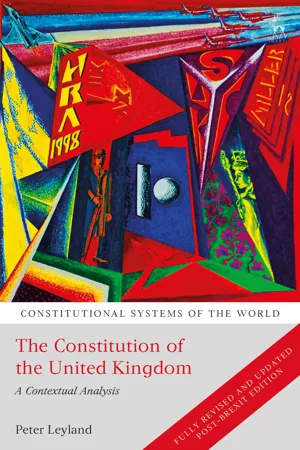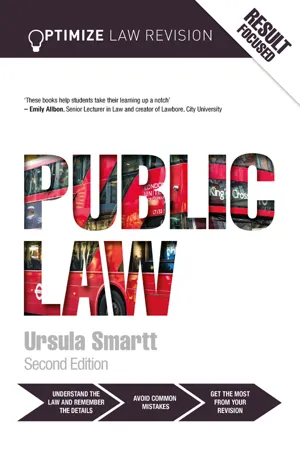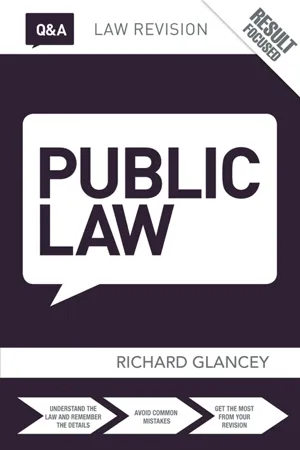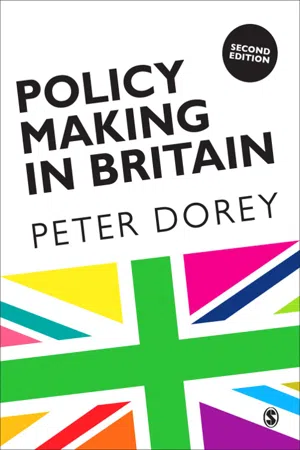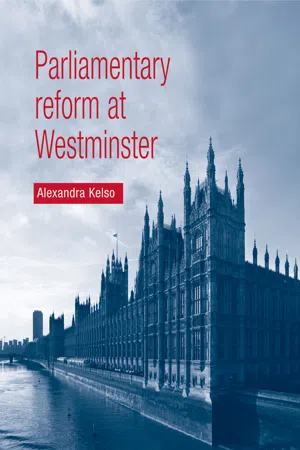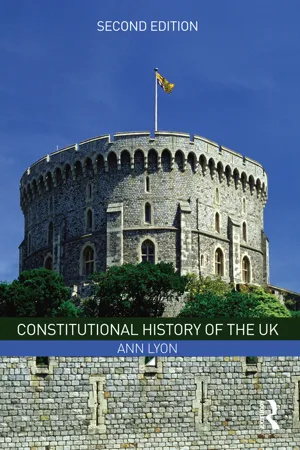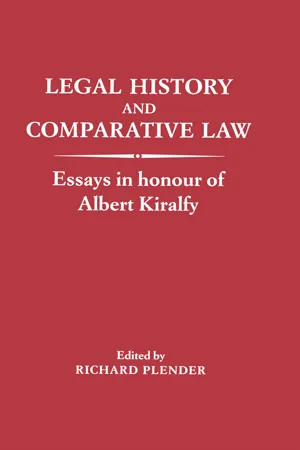House of Lords
The House of Lords is the upper chamber of the UK Parliament, composed of appointed members including life peers, bishops, and hereditary peers. It acts as a revising chamber, reviewing and suggesting amendments to legislation proposed by the House of Commons. The House of Lords also plays a role in scrutinizing the government's actions and policies.
7 Key excerpts on "House of Lords"
- eBook - ePub
The Constitution of the United Kingdom
A Contextual Analysis
- Peter Leyland(Author)
- 2021(Publication Date)
- Hart Publishing(Publisher)
...The House of Lords, which serves as the second chamber in the UK, is a very unusual body. In common with the Canadian Senate, it is entirely unelected and, as well as having a legislative role, it used to perform the crucial judicial function of being the highest domestic appellate court, although a UK Supreme Court was established in 2009 to perform this judicial appellate function. The House of Lords has been the subject of reform on several occasions; the most recent and far reaching, certainly in terms of composition, was in 1999, when the hereditary element was heavily pruned. This was to be the prelude to further reform, but, to date, there has been a lack of consensus as to what should happen next. While most commentators and politicians recognise that a second chamber should continue to have a role as a body which revises legislation and helps to scrutinise the executive, there has been much disagreement over the composition of the House of Lords or any such body that might replace it. The democratic legitimacy of the Lords has been called into question since the extension of voting rights during the course of the nineteenth century. As a hereditary body the House of Lords largely represented the landed aristocracy, but the social and economic changes resulting from the Industrial Revolution, including the growth of towns and cities, the emergence of powerful industrial interests, and the activities of protest movements and organised labour had an important bearing on politics. The response of the House of Lords to electoral reform is particularly relevant to this discussion. When the first Reform Bill of 1832 proposed a limited extension of voting rights and a fairer distribution of seats, the landed aristocracy in the House of Lords attempted to prevent the Bill’s passage through Parliament...
- eBook - ePub
- Ursula Smartt(Author)
- 2016(Publication Date)
- Routledge(Publisher)
...It makes laws, holds Government to account and investigates policy issues. Its membership is mostly appointed and includes experts in many fields. The main role of the HL is to debate and revise major legislation. The Lords regulate themselves and the order of business in the House, which means there is greater flexibility among its members to examine an issue for longer than is typical in the HC. The Lords can consider Bills before Parliament but cannot block or amend them (Parliament Acts 1911 and 1949 substantially curtailed the law-making powers of the HL). Since the removal of the majority of the hereditary peers as a result of the House of Lords Act 1999, the ‘second stage’ of HL reform has suffered a number of false starts (Constitutional Reform Act 2005). Attempts to determine the shape of a future second chamber by a previous parliamentary Joint Committee ended in failure, when the HC rejected all its options for composition. There are 783 members of the HL. Some 670 are Life Peers who are members until they die, retire or are expelled. There are 87 Hereditary Peers and 26 Bishops representing the Church of England. Today, the House of Lords Appointments Commission recommends individuals for appointment as non-party-political life peers. It also vets nominations for life peers, including those nominated by the UK political parties, to ensure the highest standards of propriety. Members can be nominated by the public and political parties. Once approved by the Prime Minister, life peerage-appointments are formalised by the Queen (or King). This means that the make-up and expertise of the HL has changed dramatically. Many members of the HL (Peers) have a political background – but some do not, known as ‘ Crossbenchers ’. Life Peers now represent a wide range of professions – in medicine, law, business, the arts, science, sports, education, the armed forces, diplomacy and public service. The HL is characterised by ‘independence of thought’...
- eBook - ePub
- Richard Glancey(Author)
- 2014(Publication Date)
- Routledge(Publisher)
...The Law Lords have now been removed from the House and make up the membership of the new Supreme Court, under the provisions of the Constitutional Reform Act 2005. The House’s second major affront to democracy formerly lay in the fact that one party, the Conservatives, historically had a permanent strong predominance, if not quite an absolute majority. Following the removal of the bulk of the hereditary peers and a deliberate and successful attempt by the Blair and Brown Governments to rebalance the Lords through the appointment of large numbers of life peers, the position has undergone a significant change. As at June 2014, the Conservatives have the most with 220 seats, while Labour have 218 seats and the Liberal Democrats have 98. 6 Very importantly, there are now 181 cross-bench peers, so that independent members represent just under a quarter (23 per cent) of the total membership. Despite its undemocratic and unrepresentative nature, most commentators accept that the House of Lords has a valuable part to play in the British constitutional process. Perhaps its most important role lies in scrutinising public Bills passed by the House of Commons, on which it spends around half of its time, making thousands of amendments each session. But the House is not simply a forum in which government can correct its own mistakes. Barnett’s conclusion is that ‘the Lords is both very active in relation to legislation, and makes a substantial impact on many legislative proposals’ (Constitutional and Administrative Law, 4th edn, 2002, p. 532). A significant number of its amendments represent changes of principle of a minor or major nature. To an extent, therefore, the Lords can compensate for the inadequate scrutiny bestowed by the Commons and can therefore provide a much-needed check on the government. Philip Norton (in Jones (ed.), Politics UK, 1994, p...
- eBook - ePub
Policy Making in Britain
An Introduction
- Peter Dorey(Author)
- 2014(Publication Date)
- SAGE Publications Ltd(Publisher)
...The vast majority of legislation emanating from the House of Commons is endorsed by the House of Lords, and on those occasions when the Second Chamber does initially inflict a defeat on the government, perhaps over a specific clause in a Bill, a compromise is usually reached, either by virtue of the House of Lords conceding (i.e., abandoning its opposition) if ministers insist on pursuing it, or because ministers agree to remove, rewrite or otherwise amend it to the satisfaction of the Second Chamber. In other words, although clashes and stand-offs between the two Houses make good headlines and stories for journalists, the normal relationship is more prosaic, usually entailing a close and constructive partnership over the conduct of parliamentary business. The routine work of the House of Lords is remarkably similar to that of the House of Commons, and in this respect, the Second Chamber generally complements the business of the Commons. Indeed, in many respects, the House of Lords alleviates some of the pressure on the House of Commons; if a Second Chamber did not exist, then (quite apart from a diminution of parliamentary checks and balances) either MPs would become completely overwhelmed and/or a second chamber of some kind would have to be invented de novo. It is to the roles and functions that the House of Commons and House of Lords play in the policy process that we now turn our attention. LEGISLATION As Parliament is a legislature, detailed consideration of proposed laws (Bills) is naturally a major function both of the House of Commons and the House of Lords...
- eBook - ePub
- Alexandra Kelso(Author)
- 2013(Publication Date)
- Manchester University Press(Publisher)
...These shifts occurred as a consequence of the desire of the House of Lords to ensure it remained a significant part of the institution of parliament despite its archaic composition. As Baldwin (1999: 41) summarises: [The House of Lords] is a product of history. It has not been made; it has grown. Herein lies the key to why the House of Lords, this curious institution which has been the subject of a protracted, often ritual, campaign of abuse, is still in existence; the key to why it has not only remained, in essence, untouched by the hand of whole-scale reform, but also to why it has not fallen victim to inward decay; they key to why the House of Lords can correctly be depicted as the perennial survivor. It is because it has an inherent evolutionary adaptability. The role of the Conservative membership of the Lords in securing the success of this evolutionary adaptability is noteworthy. The growth and development of the upper chamber into a functionally legitimate part of the political system was not the result of good fortune on the part of the peers. Rather, it was the outcome of a clear Conservative strategy, dating back over one hundred years, to counteract the fact that the chamber is not democratically legitimate. Moreover, this approach benefited from the relative failure of attempts to address simultaneously the powers and composition of the House of Lords. In 1911 and 1949, the central concern of the executive was to remove the ability of the Lords to impede its governing capacity, and thus to secure maximum parliamentary efficiency and strengthen executive sovereignty. This was done with reference to the undemocratic basis of the second chamber, and its illegitimacy in challenging the Commons. From the perspective of the executive, leaving the composition of the Lords, and its democratic illegitimacy, well alone, constrained the ability of the chamber to use what powers remained to it, thus creating a smoother path for government legislation to traverse...
- eBook - ePub
- Ann Lyon(Author)
- 2016(Publication Date)
- Routledge(Publisher)
...It is at present unclear what new legislation will be introduced, and when and in what form such legislation will take effect. The recent expenses scandal, which involved members of both Houses, has brought condemnation of several members of the Lords, two of whom served prison sentences for false accounting, and demands for reform, in particular to enable peers to be deprived of their right to sit in the House, on similar terms to those applicable to MPs convicted of criminal offences. 24.2.1 The problem It became increasingly accepted during the twentieth century that it was not appropriate for membership of a legislative house of a modern democracy to be based on birth, and the House of Lords in its existing form lacked legitimacy. On that basis, it could not continue. That is where consensus begins and ends. The issue of restructuring the House of Lords is one of peculiar difficulty, bedevilled not only by conflict over matters of principle, in particular the proper functions of a future Upper House and how its membership should be made up in order to enable it to fulfil that function, but also petty class antagonisms and elements of national, regional and party-political myth. As to function, there is polarisation between those advocating an Upper House acting as an effective restraint on the potential abuse of power by the Executive, at a time when the House of Commons has largely ceased to perform this role, and those who argue that no body should be in a position to limit the legislative power of a government which commands a majority in the Commons...
- eBook - ePub
Legal History and Comparative Law
Essays in Honour of Albert Kilralfy
- Richard Plender(Author)
- 2018(Publication Date)
- Routledge(Publisher)
...Yet it has been a feature of the central relationship between Crown and Parliament that in orthodox legal and constitutional theory the House of Commons and the House of Lords are the personal creatures of the Crown. Parliament lives and dies as the Crown commands. Despite the modern principles of constitutional monarchy and ministerial responsibility, what remains today in both politics and law is executive domination over the life of Parliament. This paper focuses on some legal and political issues in the history of the life of Parliament in the later modern period. It considers in turn the summoning of Parliaments and the period in which no Parliament is in existence (I); the duration of Parliaments and their maximum limits (Π); the legal nature of the Crown’s prerogative to dissolve Parliaments (ΕΠ); political responsibility, and the evolution of a Prime Minister’s pre-eminence in dissolution affairs (IV); the relaxation of earlier constraints upon a Ministry’s choice of electoral timing (V); the theory and practice of the Monarchy’s right to reject ministerial advice upon dissolution (VI); and in a concluding section (VII) some thoughts are given on the lessons of this parliamentary history for the future. A general purpose in writing this paper is to promote a better understanding of present-day principles and practices in the regulation of the existence of Parliament. Only a study of history can enable us to appreciate the vagaries of the present system, and help us to evaluate it better for serving the purposes of a modern democracy. I The Summoning of Parliaments Considering that the political opponents of James Π needed to resort to legal fiction and retrospective legitimisation for their acts in calling together the Convocation Parliament in January 1689, it appears curious that no formal provision was made in the constitutional settlement that followed for securing the summoning of Parliament in the Sovereign’s default...
